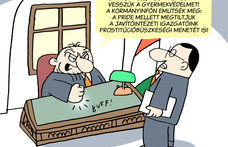A recent statement by Viktor Orbán suggests a victorious Fidesz would probably abandon the present government's goal of introducing the euro by 2010.
Until recently, nobody had any idea if Fidesz would aim to introduce the euro in 2010, committing itself to any budget cuts that might prove necessary. Although the leaders of the main opposition party have been merciless critics of the government's high-spending policies, they have spent the past four years calling for measures that would entail increased government spending or reduced government revenues. This includes the most recent proposals: one for cutting social security contributions rom 29 per cent to 19 per cent, another for introducing a 'fourteenth' monthly pension, and yet another for cutting motorway toll fees. Fidesz rejected the Gyurcsány government's most recent proposal, that of setting in law the permitted budget deficit level for the next three years so that Hungary meets the Maastricht criteria in 2008.
Mr Orbán put paid to any doubts last week, however. It was "almost impossible" to adopt the euro in 2010, he said, and though the aim should not be abandoned, he would not be prepared to countenance spending cuts to make it happen. Cuts would only take place once the economy was in a state where "anybody who wants to work, can," he said. The first thing was to stop retreating from the euro, as was now happening, but to work towards it. The "terrible" march into debt had first to be slowed, then stopped, and then turned around. If the European Union contested "the emergence of Hungary, the rebuilding of solidarity," then "that battle will have to be fought," said Mr Orbán.
This statement on television made it clear that introducing the euro in 2010 is not a priority for Fidesz, even though it was one of the conclusions of the five-month-long 'economic consultation' the party sponsored. Mr Orbán acknowledged that György Matolcsy, who compiled the report on the consultation, and who was economics minister from 2000 to 2002, would fight "tooth and nail" for the 2010 date, but he said there was a fierce debate over the matter within the party. If Mr Orbán meant it when he said "Hungary's budget deficit will be at 10 per cent by the end of the elections," then he would have to introduce a HUF1trn stabilisation package after the elections to bring the deficit down to the 5 per cent level required.
The government forecasts a budget deficit of 4.7 per cent by the end of the year (not the end of the elections), though most analysts expect the figure to be 1 or 2 percentage points higher than this. If the analysts are right, then Ferenc Gyurcsány would be also be unable to guide Hungary into the eurozone by 2010.














